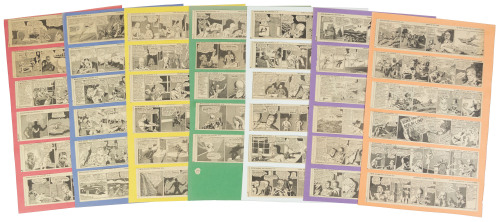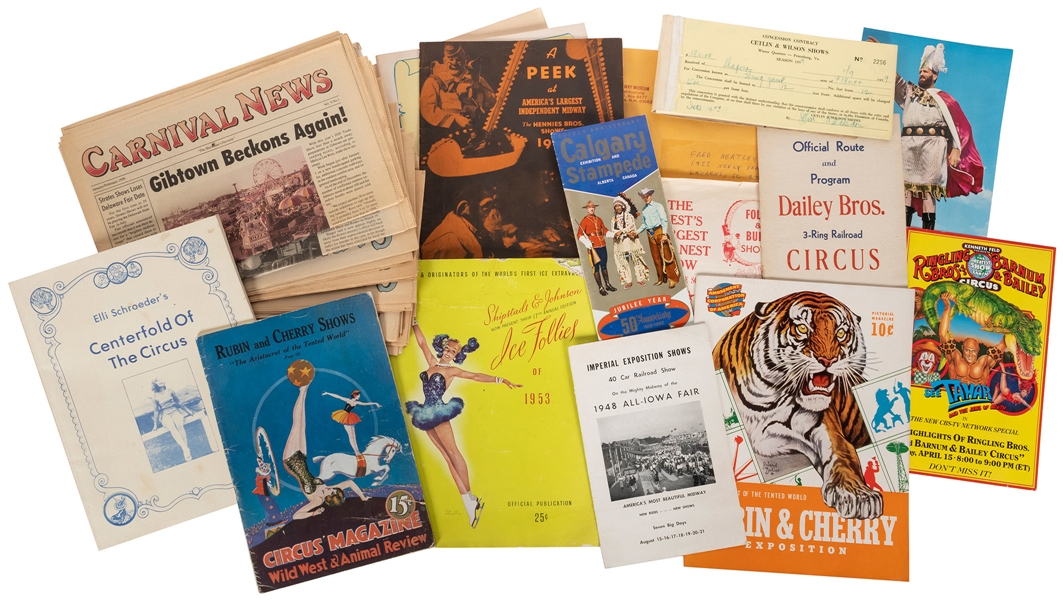Lot of 6 mid-to-late 18th-century American newspapers, comprising: Pennsylvania Packet, and Daily Advertiser. Philadelphia, PA. August 21, 1789. No. 3294. 4pp, 11.5 x 18.25 in. Reports on the Bill of Rights debated in Congress and debates on the amendments of the Constitution in a report from the House of Representatives, August 17, 1789: "Meeting in Committee of the Whole on the Subject of Amendments to the Consitution," draft amendments 8 and 9 approved, as was 10 with changes. Amendments 11-14 “agreed to in their original form.” Elbridge Gerry introduced a motion “That such amendments of the Constitution of the United States as have been proposed by the different states…be referred to the committee of the whole house and that those, with the amendments proposed by that committee, be included in one report.…” James Madison argued for amendments to guarantee individual rights in a speech in the House on June 8, 1789. Madison’s draft amendments along with proposals from the states were debated in the House and eventually approved by the House and the Senate. In September 1789, a conference committee proposed twelve amendments that were sent to the states. By 15 December 1791, three-fourths of the state legislatures adopted ten of the amendments. Also includes Indian Affairs content with Creek leader Alexander McGillibray writing on peace negotiations: “the chiefs have resolved to put off the meeting for the present…the body of warriors were in arms, owing to the commissioner's letter of last winter… but the Chiefs being ready to listen to just terms of peace, they agreed to meet the commissioners to treat as they requested; but some parties had gone out could not be stopped...having done mischief and killing several people, the...people stopped the Chiefs from proceeding to the Oconee, apprehensive that they may sustain injury and insult form the people of that country, the Chickasaws..." Windham Herald. Wyndham, CT. December 12, 1789. Vol. IX No. 458. 4pp, 10.5 x 16.5, on blue paper. Front-page text of the speech by President John Adams to Congress in Philadelphia on Dec. 3. He presses Congress for reforms in the judicial system and addresses relations with the French republic, reports on plans to move the national capital. Message signed in type by Adams. Also includes a complete list of all of the vessels in the American Navy. (Occsional spotting, worn edges, previously bound.) Weekly Museum. New York, NY. April 4, 1795. Vol VII No. 360. 4pp, 9.5 x 11.75 in. Notice of the “United States Lotter for the improvement of the city of Washington will commence in a few days..." (Bifolium split, worn edges with a few small tears, some spotting.) Colombian Centinel. Boston, MA. August 12, 1797. Vol. XXVII No. 36, Whole No. 1398. 4pp, 11.75 x 19.25 in. Entire front page devoted to the text of a new stamp tax, with news form the Congress in Philadelphia, May 15, 1797. With the full text of “An Act Laying Duties on Stamped Vellum Parchment and Paper" which included duties on a range of documents including certificates of naturalization, letters patent, and wills (which was the effective introduction of an estate tax). Complete text signed in script type by John Adams as President of the United States. Revenues from requiring a federal stamp on wills in probate and other documents were used to pay off debts incurred during the undeclared naval war with France. Congress repealed the Stamp Act in 1802. Also includes reports on naval conflict with France, with American ships detained at Cape Francois in Haiti by the French, including the schooner Hetty of Charleston. (Some spotting, previously bound) The Spectator. New York, NY. July 10, 1799 (subscriber’s copy of Yale College). Vol. II No. 187. 4pp, 13.25 x 20 in. Front-page account of an act passed by the Congress on December 3, 1798: "An Act Providing for Compensation for Collectors of Customs throughout the United States" approved and signed in type by President John Adams March 2, 179
Lot of 6 mid-to-late 18th-century American newspapers, comprising: Pennsylvania Packet, and Daily Advertiser. Philadelphia, PA. August 21, 1789. No. 3294. 4pp, 11.5 x 18.25 in. Reports on the Bill of Rights debated in Congress and debates on the amendments of the Constitution in a report from the House of Representatives, August 17, 1789: "Meeting in Committee of the Whole on the Subject of Amendments to the Consitution," draft amendments 8 and 9 approved, as was 10 with changes. Amendments 11-14 “agreed to in their original form.” Elbridge Gerry introduced a motion “That such amendments of the Constitution of the United States as have been proposed by the different states…be referred to the committee of the whole house and that those, with the amendments proposed by that committee, be included in one report.…” James Madison argued for amendments to guarantee individual rights in a speech in the House on June 8, 1789. Madison’s draft amendments along with proposals from the states were debated in the House and eventually approved by the House and the Senate. In September 1789, a conference committee proposed twelve amendments that were sent to the states. By 15 December 1791, three-fourths of the state legislatures adopted ten of the amendments. Also includes Indian Affairs content with Creek leader Alexander McGillibray writing on peace negotiations: “the chiefs have resolved to put off the meeting for the present…the body of warriors were in arms, owing to the commissioner's letter of last winter… but the Chiefs being ready to listen to just terms of peace, they agreed to meet the commissioners to treat as they requested; but some parties had gone out could not be stopped...having done mischief and killing several people, the...people stopped the Chiefs from proceeding to the Oconee, apprehensive that they may sustain injury and insult form the people of that country, the Chickasaws..." Windham Herald. Wyndham, CT. December 12, 1789. Vol. IX No. 458. 4pp, 10.5 x 16.5, on blue paper. Front-page text of the speech by President John Adams to Congress in Philadelphia on Dec. 3. He presses Congress for reforms in the judicial system and addresses relations with the French republic, reports on plans to move the national capital. Message signed in type by Adams. Also includes a complete list of all of the vessels in the American Navy. (Occsional spotting, worn edges, previously bound.) Weekly Museum. New York, NY. April 4, 1795. Vol VII No. 360. 4pp, 9.5 x 11.75 in. Notice of the “United States Lotter for the improvement of the city of Washington will commence in a few days..." (Bifolium split, worn edges with a few small tears, some spotting.) Colombian Centinel. Boston, MA. August 12, 1797. Vol. XXVII No. 36, Whole No. 1398. 4pp, 11.75 x 19.25 in. Entire front page devoted to the text of a new stamp tax, with news form the Congress in Philadelphia, May 15, 1797. With the full text of “An Act Laying Duties on Stamped Vellum Parchment and Paper" which included duties on a range of documents including certificates of naturalization, letters patent, and wills (which was the effective introduction of an estate tax). Complete text signed in script type by John Adams as President of the United States. Revenues from requiring a federal stamp on wills in probate and other documents were used to pay off debts incurred during the undeclared naval war with France. Congress repealed the Stamp Act in 1802. Also includes reports on naval conflict with France, with American ships detained at Cape Francois in Haiti by the French, including the schooner Hetty of Charleston. (Some spotting, previously bound) The Spectator. New York, NY. July 10, 1799 (subscriber’s copy of Yale College). Vol. II No. 187. 4pp, 13.25 x 20 in. Front-page account of an act passed by the Congress on December 3, 1798: "An Act Providing for Compensation for Collectors of Customs throughout the United States" approved and signed in type by President John Adams March 2, 179















Testen Sie LotSearch und seine Premium-Features 7 Tage - ohne Kosten!
Lassen Sie sich automatisch über neue Objekte in kommenden Auktionen benachrichtigen.
Suchauftrag anlegen